Why is the calculation of calories important?
Health is Wealth ( Small Changes Big Impact )

A calorie is a measurement unit used to quantify the amount of energy provided by food and beverages when consumed and metabolized by the body.
These energy units are critical for nutrition and the proper functioning of the human body. Improve calorie calculation for Perfect body weight loss! When we eat, our bodies use a process called metabolism to break down the components in food, such as carbs, lipids and proteins.
Calories are generated and utilized by our cells throughout this metabolic process to execute a variety of purposes, including maintaining body temperature, supporting physical activity and sustaining important organ functioning.
Understanding calorie intake is critical for weight management since ingesting more calories than we burn results in weight gain, whereas a calorie deficit results in weight loss. As a result, calories play an important role in balancing our dietary intake and energy expenditure, determining our general health and well-being.
It is critical to count calories per day for our general health. Eating according to our bodies’ needs is the best and healthiest way to treat our bodies and keep them on the right track. ‘Neither less nor more’.
It is critical to strike a balance between your consumption and your general lifestyle. It is critical to understand the timing of things throughout the day in order to avoid becoming fat and lose weight by using the basic approach of calorie intake.
Improve calorie calculation for Perfect body weight loss!
Causes of over consumption of calories!
There are numerous consequences of excessive calorie consumption:
1. It Naturally Causes Weight Gain

Having twice or three times your daily consumption might lead to overindulgence. Which can have an impact on the overall well-being of the human body, causing a variety of difficulties such as health issues, physical problems and being unable to work but capable of doing more.
2. Health issues

Overconsumption can also lead to an increase in fat, high blood pressure, sugar issues, obesity and lethargy. Eating more calories than is recommended is bad for our bodies. It also depends on the amount of food we consume. Quantity is always important, just like good and bad carbs.
Improve Calorie Calculation For Perfect Body Weight Loss!
3. It affects our daily life

One of the key reasons for overconsumption is the inability to focus on a certain job. Consuming more than we need has a significant impact on our lives. People tend to work more, and consume more, which might sometimes divert them from their livelihood. Unsatisfaction for the day is caused by not doing tasks correctly and in the correct order. It does not happen by itself; excessive consumption causes procrastination.
4. Sleeping Pattern

Sleeping more than normal, combined with excessive calorie consumption, may result in inactivity, a minor headache and trying all day to remind ourselves to get into action mode. The recommended amount of sleep time is 7 to 8 hours. I’ve observed occasions when ingesting extra calories alters a person’s focus and objectives for their daily goal. It has an effect on the sleeping pattern in that way, causing frustration and at times, inner chaos, which is not beneficial for the brain.
Improve calorie calculation for Perfect body weight loss!
5. It effects our eating behaviour pattern

It was a profound realization for me that overconsumption also triggers our eating patterns. Assume you’ve been on a diet for the past two months. Then, in the heat of the moment, you eat something extra, disrupting the chain of hunger management that you’ve been following for the past two months. It’s like adding a spark to a quiet process, which results in unsatisfying results.
6. Drains our brain energy

Have you ever heard the saying, “Having more power, sometimes extracts all the energy, It’s like having something powerful has a vice-versa effect?” The same is true for excessive consumption. The brain requires a certain amount of energy to function properly. If it becomes too powerful, it will have the opposite effect on our bodies. In summation, rather than giving authority to overpower to govern our inner states, we can use the power of food to help our bodies work. Remember the rule: Neither less, nor more.
Improve calorie calculation for Perfect body weight loss!
7. Reduce our ability to think

Eating too much can sometimes prevent us from thinking about anything else. Feeling a burden of excess energy occasionally produces a diversion for our brain and diverts it. That is why the phrase “eat light, feel light and live light” is so popular. In order for the body to readily regulate.
8. feeling disconnected from outer chain of events

Food is excellent, but indulging in something can make you feel isolated from the outside world. Especially if you are on the verge of gaining emotional control. If you are prone to stress, it is best to take it slowly.
Improve calorie calculation for Perfect body weight loss!
Calorie calculation for weight loss!

Calorie computation for weight reduction is calculating the number of calories required to create a calorie deficit, which is essential for reducing weight. Here are the fundamental stages for calculating your daily calorie requirements for weight loss:
What is BMR?
The number of calories you burn as your body conducts basic (basal) life-sustaining functions is known as your Basal Metabolic Rate (BMR). The resting metabolic rate (RMR) is the number of calories expended if you slept in bed all day.
1. Finding out the basal metabolic rate:
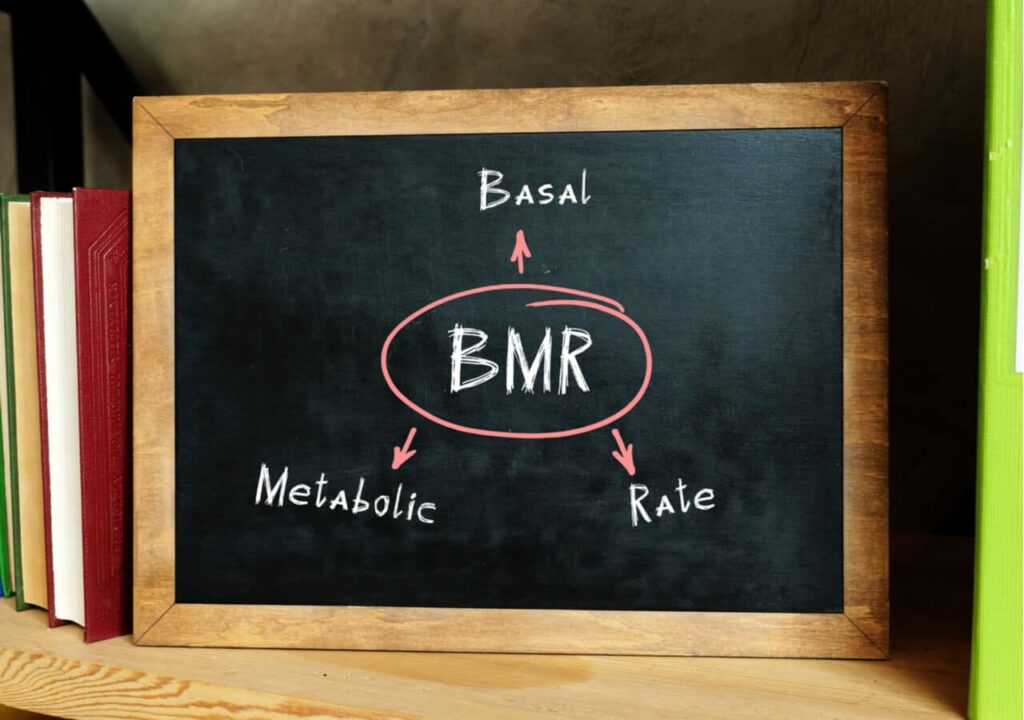
BMR is the number of calories your body requires at rest to maintain basic activities including breathing, circulation, and cell creation.
To calculate your BMR, use the Mifflin-St Jeor Equation or the Harris-Benedict Equation:
For males:
BMR = 88.362 + (13.397 x kg) + (4.799 x cm) – (5.677 x years)
BMR = 447.593 + (9.247 x weight in kg) + (3.098 x height in cm) – (4.330 x age in years) for women.
Improve calorie calculation for Perfect body weight loss!
2. include your activity level

Once you’ve calculated your BMR, you’ll need to multiply it by your activity level. The Harris-Benedict Equation yields different multipliers for different levels of activity:
Sedentary (no or little exercise): BMR x 1.2
Lightly active (1-3 days a week of light exercise or sports): BMR x 1.375
Moderately active (3-5 days per week of moderate exercise or sports): BMR x 1.55
Very active (6-7 days per week of intensive exercise or sports): BMR x 1.725
Super active (daily exercise, physical work or training): BMR x 1.9.
3. total daily energy expenditure ( tDEE )

Total Daily Energy Expenditure (TDEE) Calculation:
To calculate your TDEE, multiply your BMR by your activity level multiplier.
TDEE = BMR multiplied by Activity Level Multiplier
4. Determine your calorie deficit
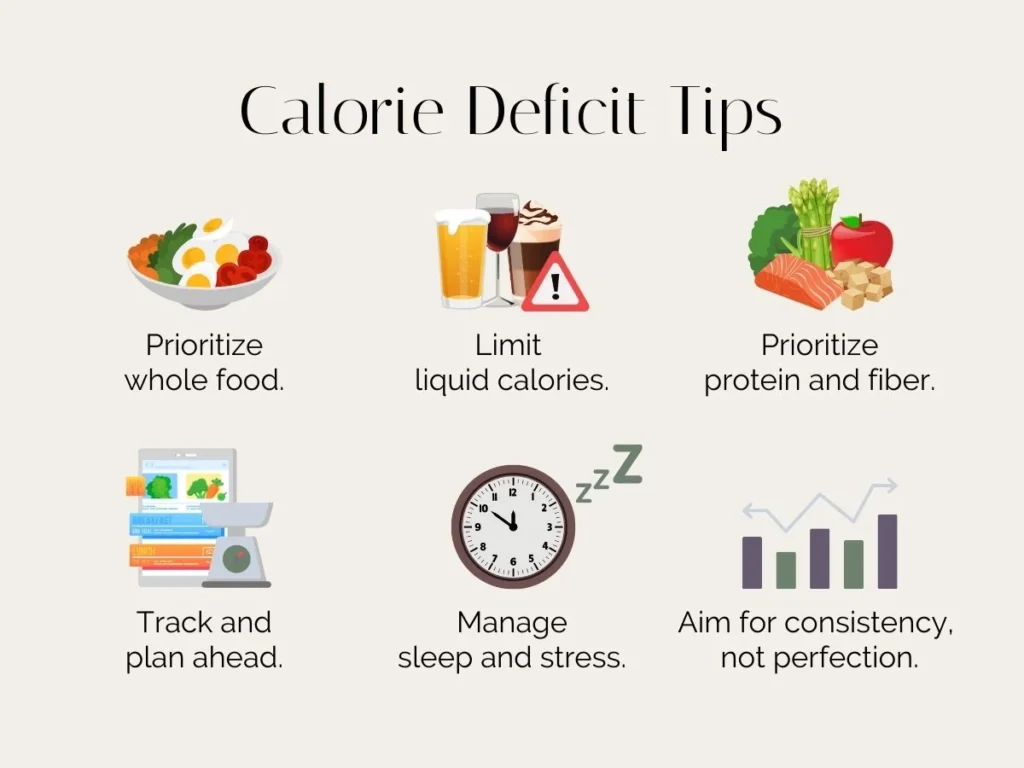
You must establish a calorie deficit by ingesting fewer calories than your TDEE in order to lose weight.
A frequent recommendation is to aim for a daily calorie deficit of 500 to 1,000, which can result in a healthy and sustainable weight loss of roughly 1-2 pounds (0.45–0.9 kg) each week. This means you should attempt to consume less calories than your TDEE by this number of calories.
Improve calorie calculation for Perfect body weight loss!
5. Set a calorie intake goal for a day
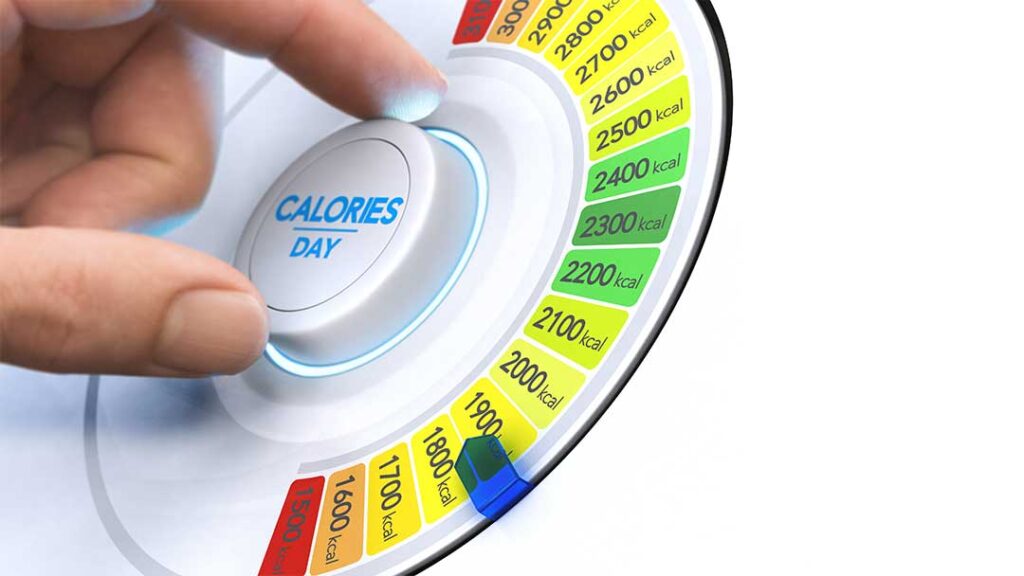
To calculate your daily calorie intake goal, subtract your desired calorie reduction from your TDEE.
To achieve proper nutrition, it is typically suggested that women consume no less than 1,200 calories per day and men consume no less than 1,500 calories per day.
6. adjust and monitor
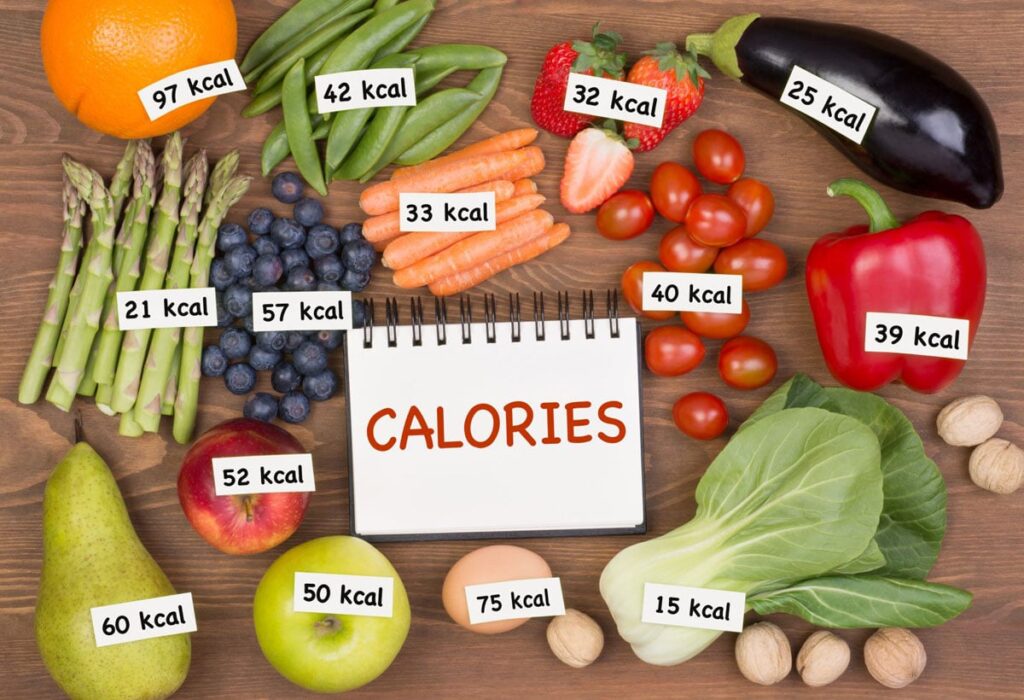
Track your calorie intake and progress on a regular basis. If you’re not losing weight at the required rate, reduce your calorie consumption or increase your exercise level.
Remember that losing weight is more than just counting calories; it’s also crucial to prioritize a good diet and frequent physical activity for long-term success and general health.
Improve calorie calculation for Perfect body weight loss!
calorie chart
A nutritious diet consumed throughout one’s life helps to prevent malnutrition in all of its manifestations, as well as a variety of noncommunicable diseases (NCDs) and disorders.
However, increased processed food production, rising urbanization and changing lifestyles have resulted in a shift in dietary trends.
individuals are eating more foods that are heavy in energy, fats, free sugars, and salt/sodium and many individuals do not eat enough fruit, vegetables and other dietary fibres like whole grains.
Individual attributes (e.g., age, gender, lifestyle and level of physical activity), cultural background, regionally accessible foods and dietary habits will all influence the exact composition of a diverse, balanced and nutritious diet. However, the fundamental concepts of what defines a healthy diet remain unchanged.
2,000 calories a day is used as a general guide for nutrition advice. Your calorie needs may be higher or lower and vary depending on your age, sex, height, weight and physical activity level.
For Adults
A healthy Diet Chart includes:-
- Fruits and vegetables, legumes (such as lentils and beans), nuts and whole grains (such as unprocessed maize, millet, oats, wheat and brown rice).
- A minimum of 400 g (five servings) of fruit and vegetables per day, omitting potatoes, sweet potatoes, cassava and other starchy roots.
- Less than 10% of total energy intake from free sugars, which is similar to 50 g (or about 12 level teaspoons) for a healthy body weight consuming approximately 2000 calories per day, but ideally less than 5% of total energy intake for additional health benefits.
- All sugars added to foods or drinks by the manufacturer, cook,or consumer, as well as sugars naturally present in honey, syrups, fruit juices and fruit juice concentrates are considered free sugars.
- Fats account for less than 30% of overall calorie intake. Unsaturated fats (found in fish, avocado and nuts, as well as sunflower, soybean, canola, and olive oils) are preferable to saturated fats (found in fatty meat, butter, palm and coconut oil, cream, cheese, ghee and lard) and trans-fats of all kinds, including both industrially-produced trans-fats (found in baked and fried foods as well as pre-packaged snacks and foods like frozen pizza, pies, cookies.
- Less than 5 g of salt per day (equal to around one teaspoon). Iodized salt should be used.
Improve calorie calculation for Perfect body weight loss!
For Infants and young children
Optimal diet promotes healthy growth and cognitive development in children during their first two years of life. It also lowers the chances of being overweight or obese, as well as acquiring NCDs later in life.
Infant and child nutrition advice is comparable to adult nutrition advice, however the following factors are especially important:
- Infants should be breastfed exclusively during the first 6 months of life.
- Infants should be breastfed continuously until 2 years of age and beyond.
- From 6 months of age, breast milk should be complemented with a variety of adequate, safe and nutrient-dense foods. Salt and sugars should not be added to complementary foods.
Practical tips for eating a healthy diet
fruits and vegetables

Eating at least 400 g, or five portions, of fruit and vegetables per day reduces the risk of NCDs and helps to ensure an adequate daily intake of dietary fibre.
Fruit and vegetable intake can be improved by:
- Always including vegetables in meals;
- Eating fresh fruit and raw vegetables as snacks;
- Eating fresh fruit and vegetables that are in season; and
- Eating a variety of fruit and vegetables.
Fats
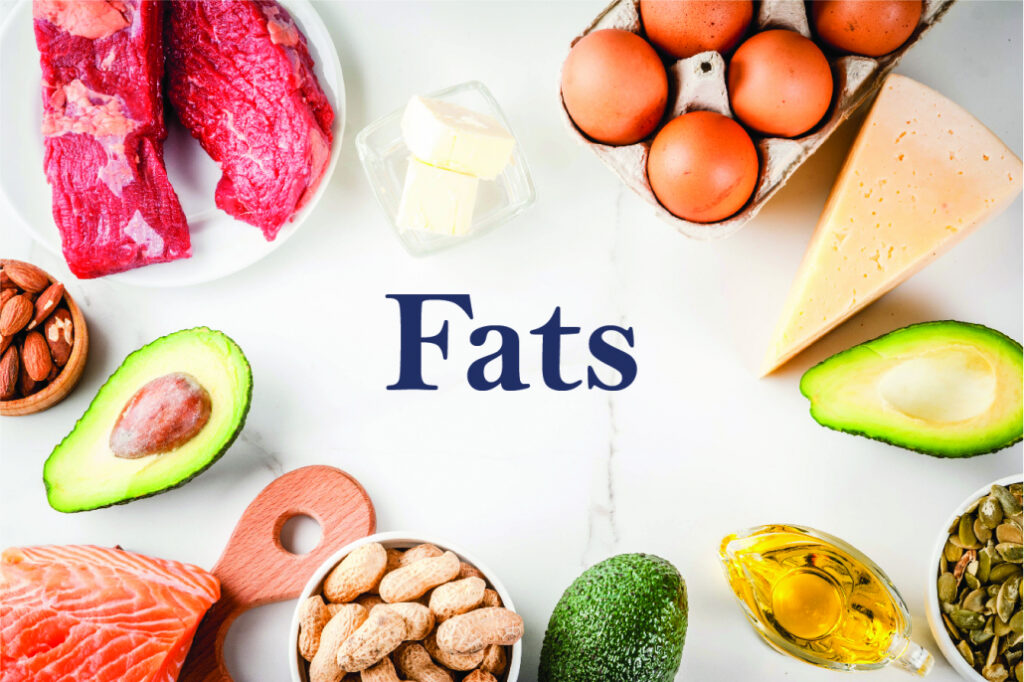
Reducing total fat consumption to less than 30% of total calorie intake aids in the prevention of unhealthy weight gain in the adult population. Furthermore, the chance of getting NCDs is reduced by:
Improve calorie calculation for Perfect body weight loss!
lowering saturated fat intake to less than 10% of total energy intake; lowering trans fat intake to less than 1% of total energy intake; and replacing both saturated and trans fats with unsaturated fats, particularly polyunsaturated fats.
Fat consumption, particularly saturated fat and industrially manufactured trans fat consumption can be lowered by:
When cooking, use steaming or boiling rather than frying.
replacing butter, lard and ghee with oils rich in polyunsaturated fats, such as soybean, canola (rapeseed), corn, safflower and sunflower oils; eating reduced-fat dairy foods and lean meats or trimming visible fat from meat; and limiting the consumption of baked and fried foods and pre-packaged snacks and foods (e.g. doughnuts, cakes, pies, cookies, biscuits and wafers) that contain industrially-produced trans-fats.
salt, sodium and potassium

Most people consume too much sodium through salt (an average of 9-12 g of salt per day) and too little potassium (less than 3.5 g). High sodium and potassium intake both lead to high blood pressure, which raises the risk of heart disease and stroke.
Reduced salt consumption to less than 5 g per day could avoid 1.7 million deaths per year.
People are frequently ignorant of how much salt they ingest. In many nations, the majority of salt is obtained through processed foods (e.g., ready meals; processed meats such as bacon, ham and salami; cheese; and salty snacks) or from foods consumed in significant quantities on a regular basis (e.g., bread).
Salt is also added to dishes while cooking (for example, bouillon, stock cubes, soy sauce and fish sauce) or at the table (for example, table salt).
Salt consumption can be lowered by:
reducing the use of salt and high-sodium condiments (e.g., soy sauce, fish sauce, and bouillon) when cooking and preparing dishes; not putting salt or high-sodium sauces on the table; reducing salty snack consumption; and selecting items with lower sodium content.
Some food producers are reformulating recipes to lower salt content in their products and consumers should be urged to read nutrition labels to see how much sodium is in a product before purchasing or ingesting it.
Potassium can help to reduce the detrimental effects of high sodium consumption on blood pressure. Consuming fresh fruits and vegetables might help to boost potassium intake.
Improve calorie calculation for Perfect body weight loss!
sugars
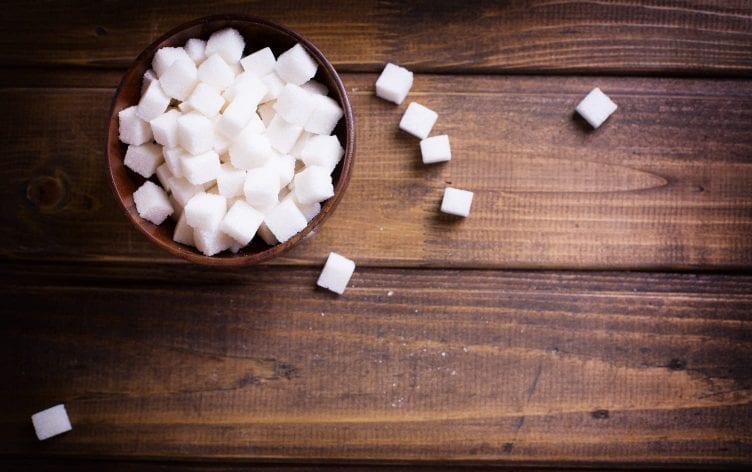
Free sugar intake should be kept to less than 10% of total energy intake in both adults and children. A reduction in total calorie consumption of less than 5% might give significant health benefits.
Free sugar consumption raises the risk of dental caries (tooth decay). Excess calories from free sugar-rich foods and beverages contribute to unhealthy weight gain, which can lead to overweight and obesity. Recent evidence also suggests that free sugars influence blood pressure and serum lipids and that reducing free sugar intake lowers risk factors for cardiovascular disease.
Sugar consumption can be lowered by:
sugary snacks, candies and sugar-sweetened beverages (i.e. all types of beverages containing free sugars – these include carbonated or non-carbonated soft drinks, fruit or vegetable juices and drinks, liquid and powder concentrates, flavoured water, energy and sports drinks, ready to drink tea, ready to drink coffee and flavoured milk drinks); and eating fresh fruit and raw vegetable.
How can you calculate your Per day calorie?

The foundation of every excellent fitness plan is getting your diet right and the first step is determining what your daily calorie needs are.
There are numerous online calculators available to help you determine how many calories you should consume every day. Some are adequate, but most calorie calculators oversimplify by requiring simply your age, weight and gender (and sometimes BMI).
If you’re a fitness lover like me, you’ll want to know the correct scientific method for determining your daily calorie needs.
It’s a simple 5-step procedure. In the example below, I’ve used my own data to demonstrate how I calculate my daily calorie requirements.
Improve calorie calculation for Perfect body weight loss!
How To Determine Your Daily Calorie Requirements
Follow These Simple Procedures To Calculate Your Daily ‘Maintenance Calories’:-
Knowing how many calories you should consume each day might help you lose, gain or maintain weight. The Harris-Benedict formula, which is used to estimate your basal metabolic rate (BMR), is one approach for determining this.
BMR is defined as your resting rate of metabolism (the conversion of calories and oxygen to energy). It is the bare minimum of energy required to keep basic activities like breathing, digestion and circulation running. The Harris-Benedict method is frequently used to aid weight loss by ensuring that you consume less calories than you require to maintain your weight.
The Harris-Benedict formula is used to calculate your basal metabolic rate (BMR). Your BMR is determined by your gender, age and body size and calculating it shows you how many calories you burn simply by being alive and awake.
The BMR formula is quite complex-
step 1: Calculate your BMR
BMR = 655.1 + (9.563 x weight in kg) + (1.850 x height in cm) – (4.676 x age in years) for women
BMR = 66.47 + 13.75 x weight in kg + 5.003 x height in cm – (6.755 x age in years) for men
Step 2: Calculate your AMR
Sedentary (no or little exercise): AMR = BMR x 1.2
Lightly active (1-3 days of activity per week): AMR = BMR x 1.375
Moderately active (3-5 days per week of exercise): AMR = BMR x 1.55
Active (6-7 days of exercise each week): AMR = BMR x 1.725
AMR = BMR x 1.9 if you are very active (hard workout 6-7 days per week).
For the purpose of weight loss, the AMR allows you to calculate how many calories you must either remove or burn through increased exercise in order to lose a given amount of weight.
If your BMR is 1,400 (the average for American women) and you exercise moderately, your AMR is 2,170 (1,400 x 1.55). Because one pound of fat equals 3,500 calories, you would need to decrease 500 calories every day to lose one pound per week. This is referred to as your calorie deficit.
If you just intend to reduce weight through nutrition, your daily calorie intake would be 1,670 (2,170 – 500 = 1,670). If you intend to do it solely through exercise, you will need to burn 500 calories per day in addition to what you now do. As a result, combining food and exercise almost always yields the best results.
Pingback: Why Quality of Reps Beats Quantity Every Time